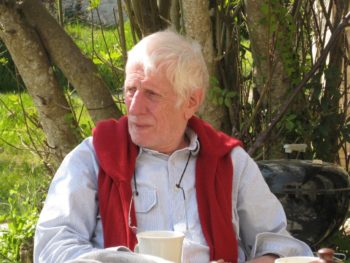
Humanists UK is deeply sad to report the death of its patron, the author and polymath Sir Jonathan Miller CBE.
Sir Jonathan Miller was born into a Jewish family in 1934 and grew up in Hampstead. He studied natural sciences and medicine at St John’s College, Cambridge and University College London, graduating in 1959. He worked as a hospital doctor for the next two years, but became best known as a writer, performer, theatre and opera director, television presenter, and producer.
He first came to public attention as one of the writers and performers of the Cambridge Footlights 1960 production at the Edinburgh Festival ‘Beyond the Fringe’. The show, which was a forerunner of the satire boom of the 1960s, transferred to the West End, and then to New York, but Miller left to become editor and presenter of the BBC TV arts programme Monitor. In 1966 he wrote, produced and directed a film adaptation of Alice in Wonderland for the BBC, and in 1968 Whistle and I’ll Come to You, an adaptation of an M. R. James’ ghost story. He produced 12 Shakespeare plays for the BBC in the early 1980s. In the 1970s, he started directing and producing operas and he continued to direct opera and plays both in the UK and abroad.
Miller’s quick rise to fame at the BBC came as the public was hungry for a change of approach from the public broadcaster. As historian Calum Brown wrote, Miller was one of ‘many key figures of comedy from the 1960 onwards’ who were ‘atheists, agnostics, humanists, or rationalists’. Brown writes that ‘the thread of religious criticism was strong in the satire boom’, and Miller’s own contributions to public awareness of humanism and humanist concerns was significant.
A longtime member of Humanists UK, Miller was passionate about humanism and keen to shed light on what he saw as an under-explored history of humanist thinking and its positive impact on society. In 2004, he wrote and presented Atheism: A Rough History of Disbelief, which aired on the BBC and explored his humanism and ‘the hidden story of atheism’ around the world. Additional material from the recordings became the in-depth series The Atheism Tapes, which Humanists UK sold on its website for several years.
His commitment to organised humanism extended to other organisations, too, and he was President of the Rationalist Association, which publishes the magazine New Humanist, for several years. On his appointment he wrote:
‘Not believing in religion is very widespread and very longstanding but I think this community gets overlooked. There is a large unrepresented constituency of people for whom religion doesn’t enter their heads, or at least they do not employ religious ways of thinking. With the rise of aggressive militant forms of belief… it seems to me one of the primary functions of this community is to explore religious beliefs and to analyse them with an objective curiosity and a kind of anthropological attitude to what people do.’
As well as being a comic, writer, and broadcaster of considerable acclaim, Miller also possessed a genuine aptitude for aptitudes – he found it easy to master skills that others spent a lifetime learning and honing. He lent his expertise to factual programmes about the history of medicine, and in in the early 1970s, he held a research fellowship in the history of medicine at University College, London. He became a Research Fellow in Neuropsychology at Sussex University in 1985.
His commitment to humanism encouraged a wide-ranging interest in Humanists UK’s campaigns for rational thinking and kindness in public policy. In 2014, he was one of a number of Humanists UK patrons who rebuked Prime Minister David Cameron in a high-profile open letter, criticising his claims for Britain as a ‘Christian country’. In 2016, he was part of an effort from Humanists UK and the organisation My Life, My Death, My Choice to urge the Scottish Parliament to back plans to legalise assisted dying. This same campaigning zeal had been with him practically all his life. In the 1970s, he served as Vice President of the Campaign for Homosexuality Equality – at whose conference in 1979, the Humanists UK section LGBT Humanists was born.
Humanists UK Chief Executive Andrew Copson said:
‘Jonathan was a uniquely talented individual who brought smiles to millions of faces across the country. He possessed a big heart and a rare sort of mind – always hungry to know the world better, infinitely curious about people, and ever determined to stand up for the causes he believed in. These values made him a loyal friend of Humanists UK and the humanist movement more broadly. We will miss him enormously.’
Notes
Humanists UK is the national charity working on behalf of non-religious people. Powered by over 85,000 members and supporters, we advance free thinking and promote humanism to create a tolerant society where rational thinking and kindness prevail. We provide ceremonies, pastoral care, education, and support services benefitting over a million people every year and our campaigns advance humanist thinking on ethical issues, human rights, and equal treatment for all.
Humanists UK has over 170 patrons who support its work in various ways through their expertise and prominence in various fields. Existing patrons include significant figures from the spheres of science, philosophy, human rights activism, politics, the arts, and broadcasting. Alongside its patrons, Humanists UK has a President and a number of Vice Presidents. From January 2019, its President has been scientist and broadcaster Professor Alice Roberts, supported by Vice Presidents Professor Jim Al-Khalili, Shappi Khorsandi, Polly Toynbee, and Professor A C Grayling.
